Suk-in Chang. Modern Conversational Korean
Подождите немного. Документ загружается.

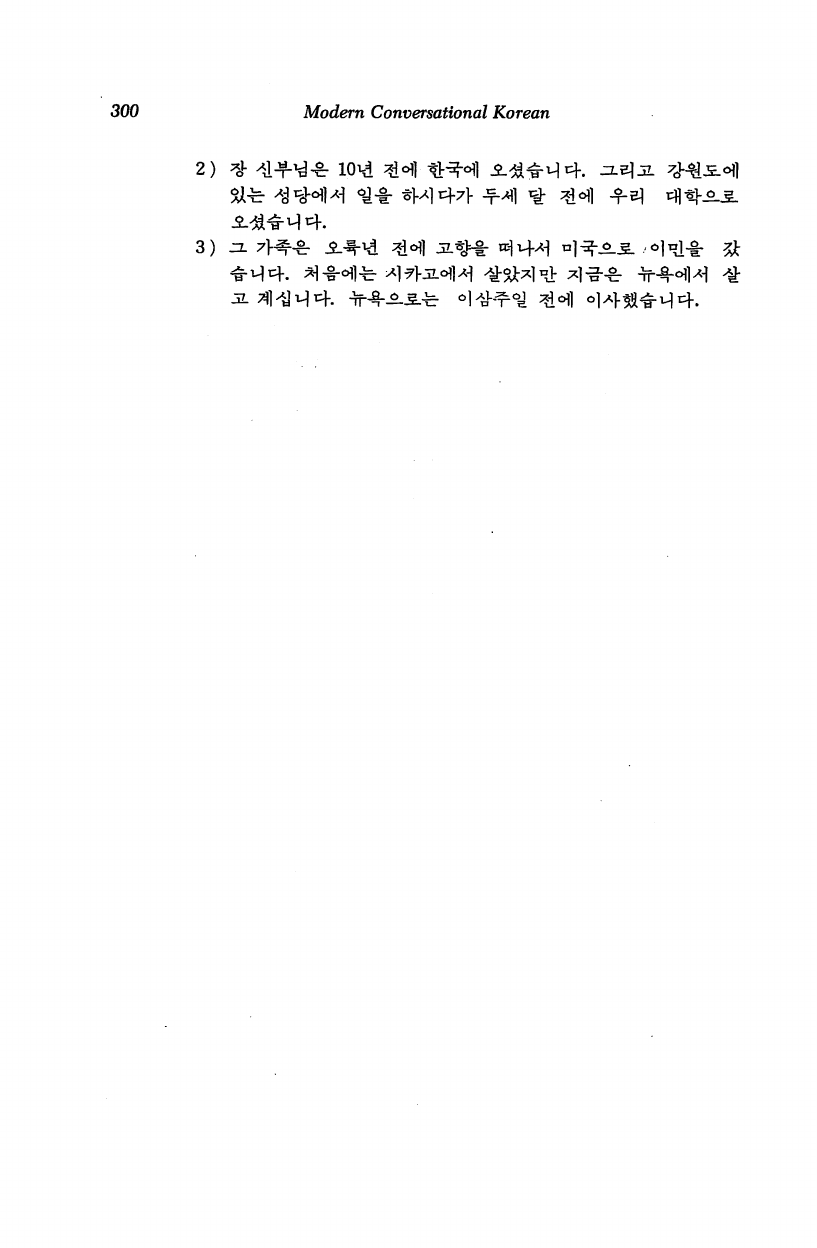
300
Modern
Conversational
Korean
2)
3)
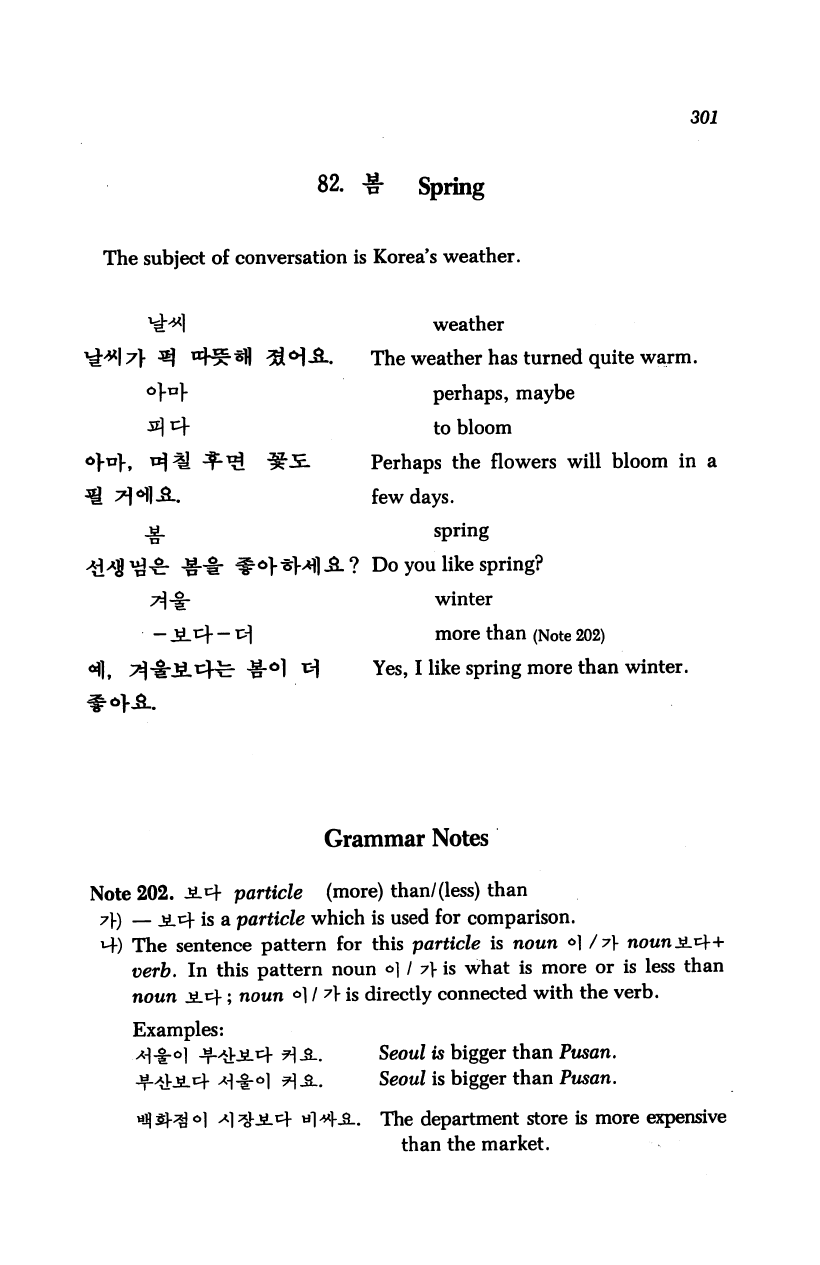
301
82.
^r
Spring
The
subject
of
conversation
is
Korea's
weather.
weather
.
The
weather
has
turned
quite
warm,
perhaps,
maybe
to
bloom
Perhaps
the
flowers
will
bloom
in
a
few
days,
-fr
spring
♦*
#*>*M|-fi.?
Do
you
like
spring?
winter
-
r>\
more
than
(Note
202)
Yes,
I
like
spring
more
than
winter.
Grammar
Notes
Note
202.
J14
particle
(more)
than/(less)
than
7\)
—
jiitf
is
a
particle
which
is
used
for
comparison.
^4)
The
sentence
pattern
for
this
particle
is
noun
°\
/
y\
verb.
In
this
pattern
noun
*>1
/
y\
is
what
is
more
or
is
less
than
noun
$jc\
;
noun
61
/
A
is
directly
connected
with
the
verb.
Examples:
?]&_.
Seoul
is
bigger
than
Pusan.
Seoul
is
bigger
than
Pusan.
The
department
store
is
more
expensive
than
the
market.
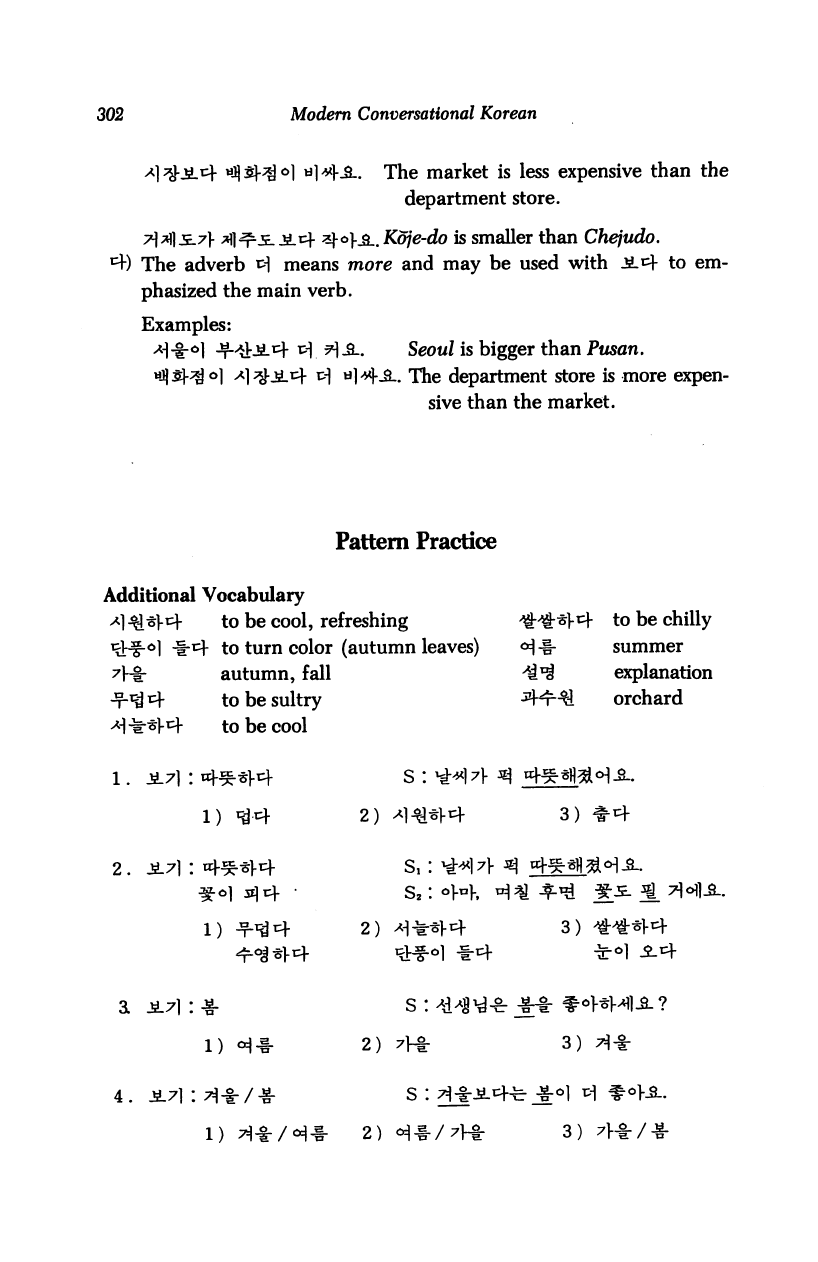
302
Modern
Conversational
Korean
.
The
market
is
less
expensive
than
the
department
store.
_.
Koje-do
is
smaller
than
Chejudo.
The
adverb
*H
means
more
and
may
be
used
with
Jitf
to
em
phasized
the
main
verb.
Examples:
.
H-S--
SeowZ
is
bigger
than
Pusan.
i>|
ti]*)-_a_.
The
department
store
is
more
expen
sive
than
the
market.
Pattern
Practice
Additional
Vocabulary
to
be
cool,
refreshing
^^f^f
to
be
chilly
-f-cf
to
turn
color
(autumn
leaves)
<*}-!-
summer
autumn,
fall
to
be
sultry
to
be
cool
explanation
orchard
2
.
4.
1)
1)
s:
s,:
s2:
2)
2)
s
:
2)
7V*
S
I
3)
3)
^-o]
♦*■
3)
2)
3)
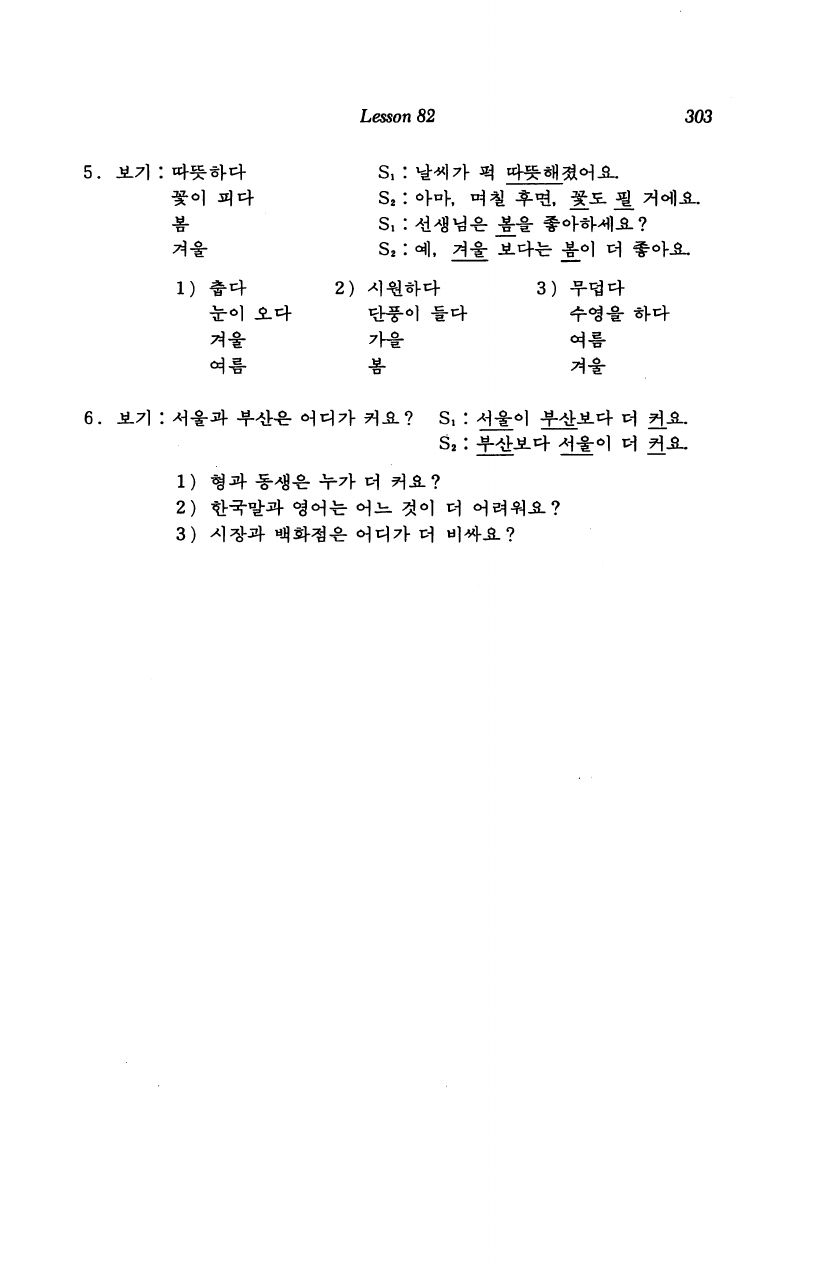
Lesson
82
303
*
1)
2)
3)
S,
s2
s,
s2
2)
*
s,
^-
«8<H-te-
H^
^-=-1
3)
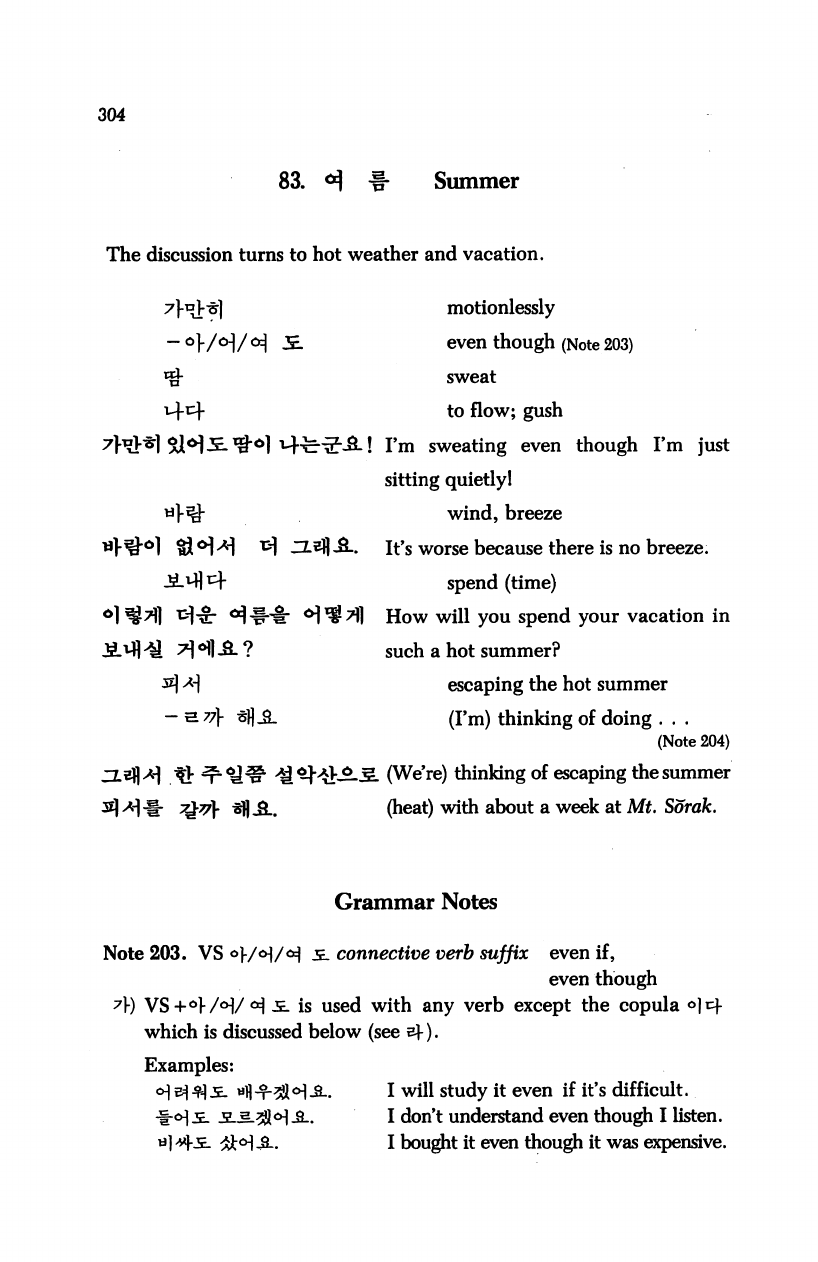
304
83.
<*}
-§•
Summer
The
discussion
turns
to
hot
weather
and
vacation.
motionlessly
even
though
(Note
203)
sweat
to
flow;
gush
I'm
sweating
even
though
I'm
just
sitting
quietly!
wind,
breeze
It's
worse
because
there
is
no
breeze.
spend
(time)
How
will
you
spend
your
vacation
in
such
a
hot
summer?
escaping
the
hot
summer
(I'm)
thinking
of
doing
. . .
(Note
204)
.
(We're)
thinking
of
escaping
the
summer
(heat)
with
about
a
week
at
Aft.
Sorak.
Grammar
Notes
Note
203.
VS
°}/°]/tf
je.
connective
verb
suffix
even
if,
even
though
A)
VS+O>/<H/CH
^-
is
used
with
any
verb
except
the
copula
<^]cf
which
is
discussed
below
(see sf).
Examples:
I
wiU
study
tt
even
if
it:'s
difficult.
I
don't
understand
even
though
I
listen.
I
bought
it
even
though
it
was
expensive.
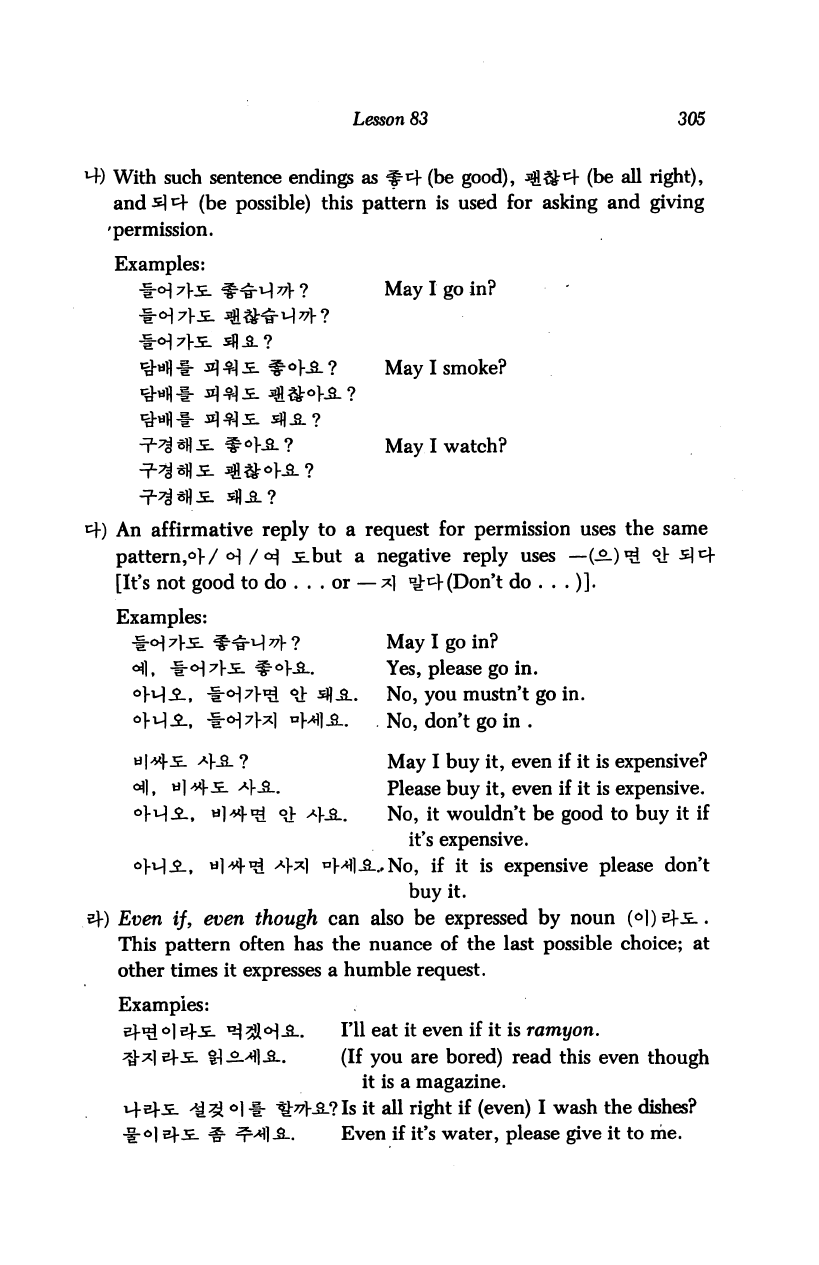
Lesson
83
305
With
such
sentence
endings
as
f-4
(be
good),
^&*+
(be
all
right),
and
*\
i=f
(be
possible)
this
pattern
is
used
for
asking
and
giving
'permission.
Examples:
May
I
go
in?
q
-f-
n)
4|
s.
$-
°\sl
?
May
I
smoke?
May
I
watch?
An
affirmative
reply
to
a
request
for
permission
uses
the
same
pattern,6!-/
<H
/<*}
i.but
a
negative
reply
uses
—(-£-)*£
°J:
s]^
[It's
not
good
to
do
...
or
—
*1
^4
(Don't
do
...)].
Examples:
-f-<H
7f5_
^^ri-l
^f
?
May
I
go
in?
<*fl,
-iM7!--^
#°K&-.
Yes,
please
go
in.
CJ:
$\£l.
No,
you
mustn't
go
in.
No,
don't
go
in
.
May
I
buy
it,
even
if
it
is
expensive?
<^|,
a]
ttySL.
4-&-.
Please
buy
it,
even
if
it
is
expensive.
°J:
<4JL.
No,
it
wouldn't
be
good
to
buy
it
if
it's
expensive.
4*1
*M]-3-.'No,
if
it
is
expensive
please
don't
buy
it.
»-)
Even
if,
even
though
can
also
be
expressed
by
noun
(6))efi..
This
pattern
often
has
the
nuance
of
the
last
possible
choice;
at
other
times
it
expresses
a
humble
request.
Examples:
I
o]
e}-_E_
^3JM-SL.
I'll
eat
it
even
if it is
ramyon.
|
efi.
t}
.2.^1.3..
(If
you
are
bored)
read
this
even
though
it is
a
magazine.
:
°l
1-
^:^V-2-?Is
it
all
right
if
(even)
I
wash
the
dishes?
Even
if
it's
water,
please
give
it
to
me.
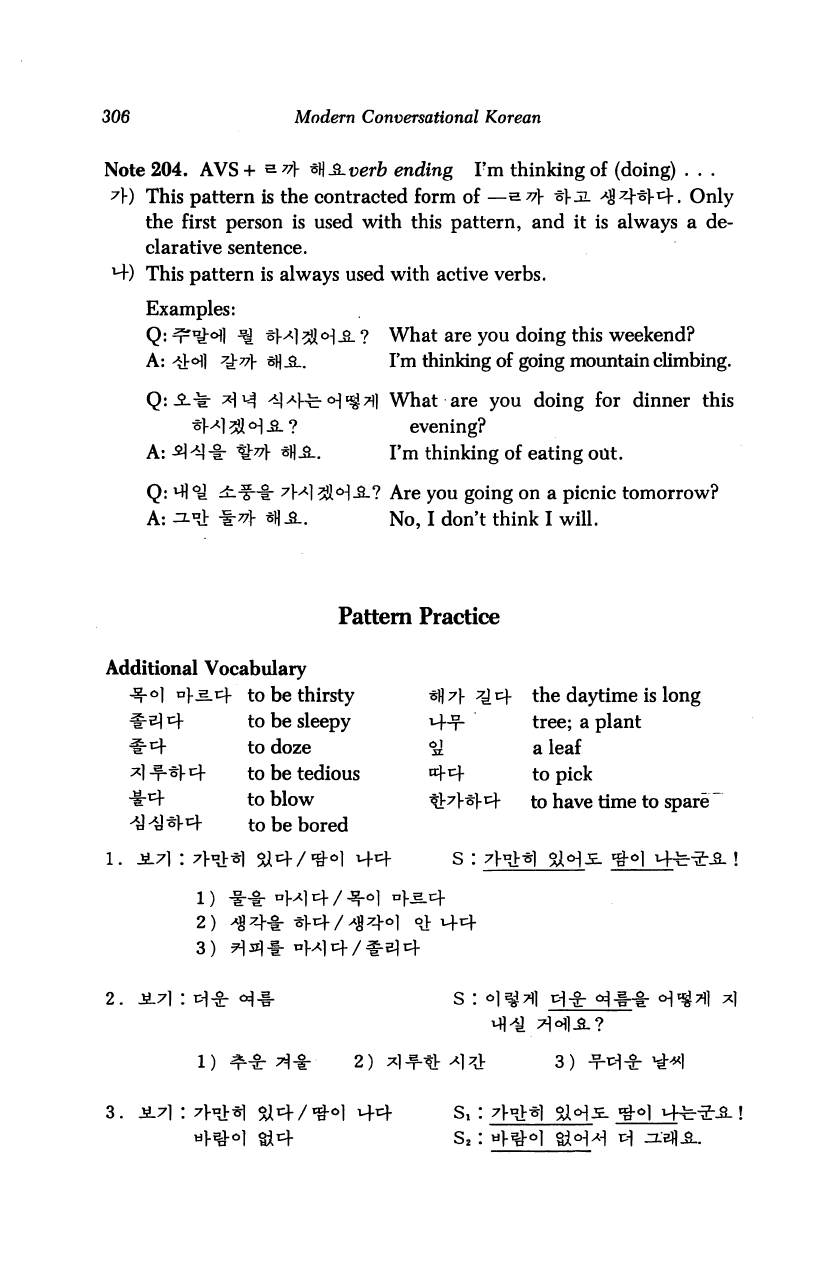
306
Modern
Conversational
Korean
Note
204.
AVS
+
&
v\
*l\£-verb
ending
I'm
thinking
of
(doing)
.
.
.
?\)
This
pattern
is
the
contracted
form
of
—
s^V
*VjL
^§^1-^-.
Only
the
first
person
is
used
with
this
pattern,
and
it
is
always
a
de
clarative
sentence.
M-)
This
pattern
is
always
used
with
active verbs.
Examples:
Q:
^ffrofl
jg
^l
3H_s_
?
What
are
you
doing
this
weekend?
A:
4°fl
Qw}
*H-SL.
I'm
thinking
of
going
mountain
climbing.
What
are
you
doing
for
dinner
this
evening?
A:
-*H
-8:
tM-
*$£_.
rm
thinking
of
eating
oat.
Q:
m
<y
dL-§--!:
^Ml
^JIH^-?
Are you
going
on
a
picnic
tomorrow?
A:
^ai
*^
«HA.
No,
I
don't
think
I
will.
Pattern
Practice
Additional
Vocabulary
-e-o]
tr]..H_cf
to
be
thirsty
sfl;?!-
^cf
the
daytime
is
long
to
be
sleepy
H-t-
tree;
a
plant
to
doze
°A
a
leaf
to
be
tedious
^44
to
pick
to
blow
^^l-i^
to
have
time
to
spare
to
be
bored
2)
3)
2.
2)
*l-f-*
^1^
3)
«f*dl
ail4
s2:
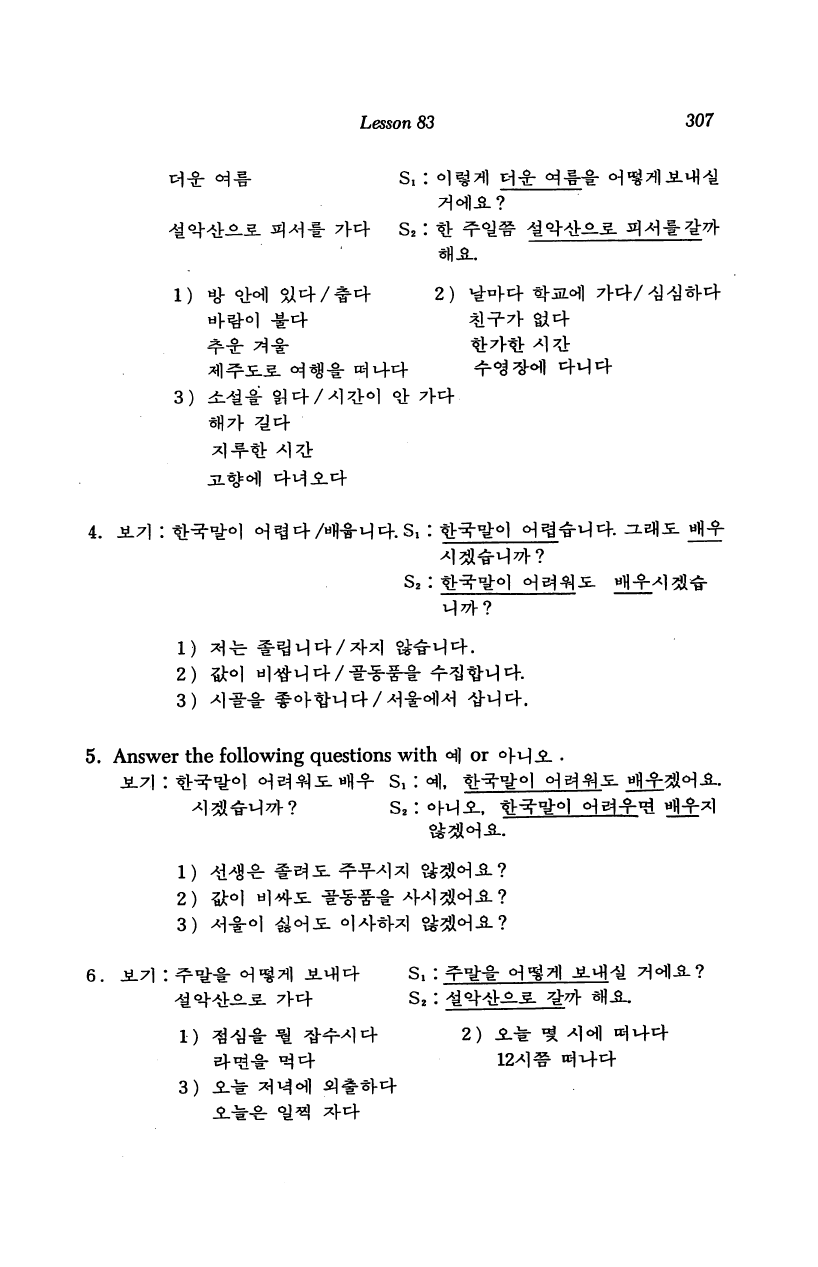
Lesson
83
307
S,
:
4
s2:
2)
4.
2)
3)
5.
Answer
the
following
questions
with
<^1
or
afl-f
S,
:
<4t.
S2:
l)
2)
3)
s,
:
s2:
1)
^^-1:
^
^4-^14
2)
3)
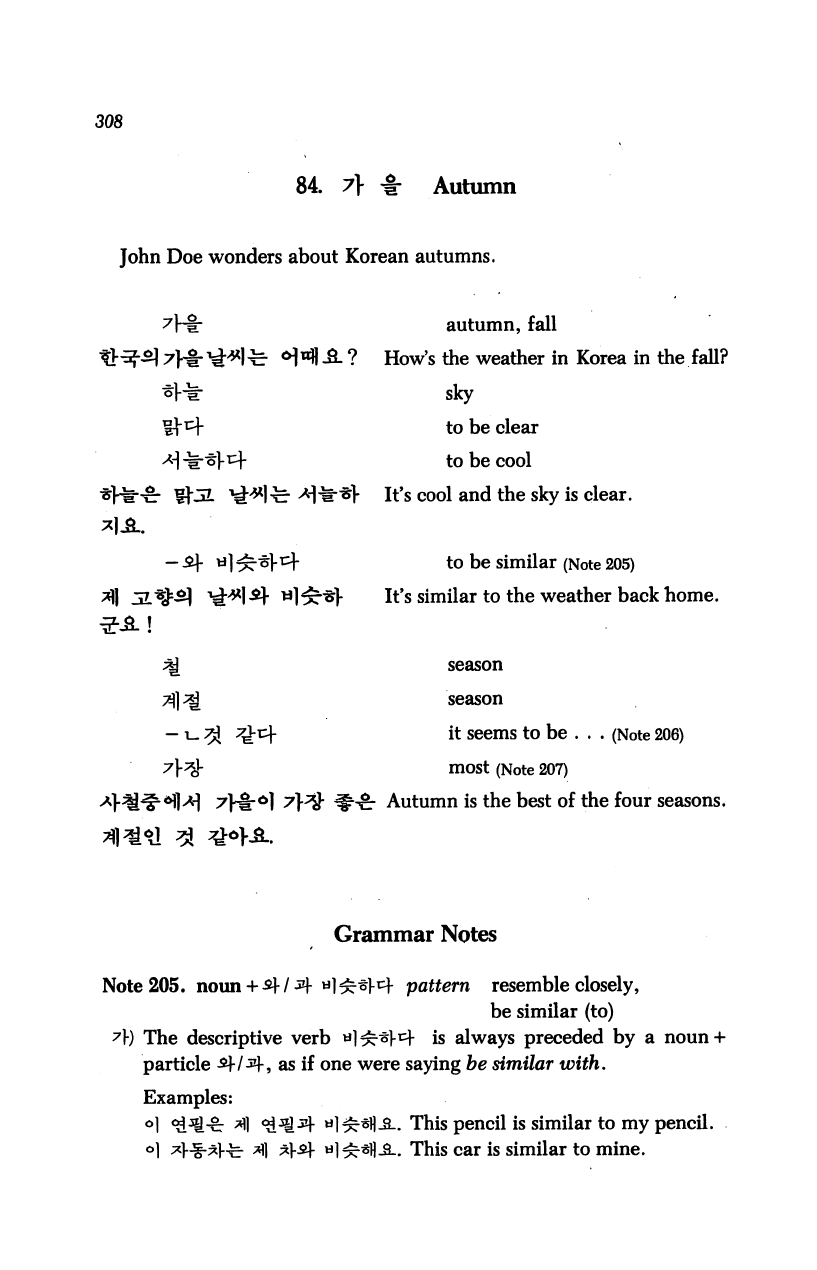
308
84.
7}
-§•
Autumn
John
Doe
wonders
about
Korean
autumns.
autumn,
fall
°H
-S-
?
How's
the
weather
in
Korea
in
the
fall?
sky
to
be
clear
to
be
cool
It's
cool
and
the
sky
is
clear.
to
be
similar
(Note
205)
It's
similar
to
the
weather
back
home.
season
season
it
seems
to
be
...
(Note
206)
most
(Note
207)
Autumn
is
the
best
of
the
four
seasons.
Grammar
Notes
Note
205.
noun
+
$■
I
^-
^]^}^
pattern
resemble
closely,
be
similar
(to)
A)
The
descriptive
verb
al^]-1^
is
always
preceded
by
a
noun
+
particle
-^/^h
as
if
one
were
saying
be
similar
with.
Examples:
°1
^^-c:
^1
^^fl^f
a]^fl-2-.
This
pencil
is
similar
to
my
pencil.
°1
^1-S-^V-te-
^1
*\s\
«l^«fl-S-.
This
car
is
similar
to
mine.
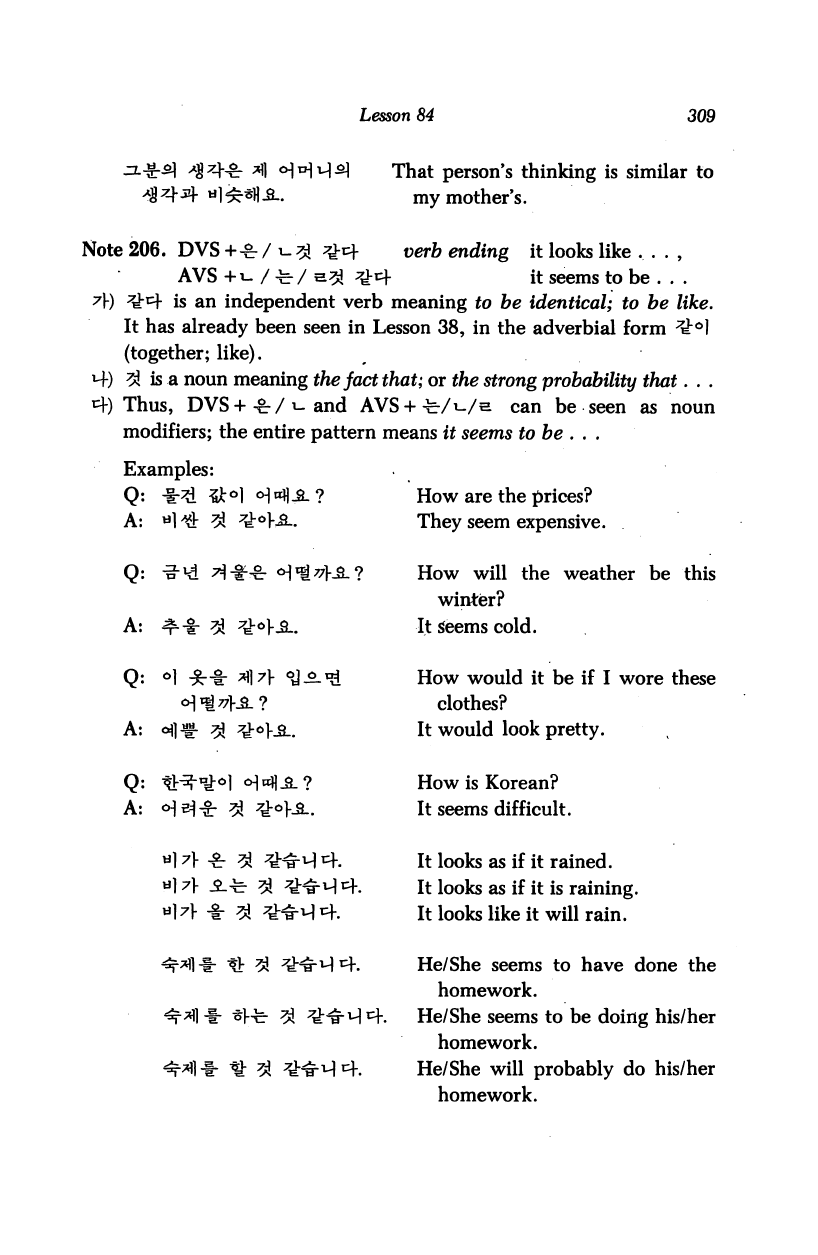
Lesson
84
309
That
person's
thinking
is
similar
to
my
mother's.
Note
206.
DVS
+*
/
i_
%
t^x\
verb
ending
it
looks
like
AVS
+i-
/
-feV
&3i
^4
it
seems
to
be
...
7Y)
^4
is
an
independent
verb
meaning
to
be
identical;
to
be
like.
It
has
already
been
seen
in
Lesson
38,
in
the
adverbial
form
^°]
(together;
like).
W-)
^
is
a
noun
meaning
the
fact
that;
or
the
strong
probability
that.
. .
4)
Thus,
DVS
+-gr
/
i-and
AVS
+
^/i-/e
can
be
seen
as
noun
modifiers;
the
entire
pattern
means
it
seems
to
be
.
.
.
Examples:
Q:
-i:^
$k°]
<H**]-£-?
How
are
the
prices?
A:
H
^t
3J 7Tto}£-.
They
seem
expensive.
Q:
-a-1^
^^-£-
H^^f-S.?
How
will
the
weather
be
this
winter?
A:
^"%r
3l
^V-SL
It
Seems
cold.
Q:
°1
^r-8:
A
A
^-^-^
How
would
it
be
if
I
wore
these
^^KSl?
clothes?
A:
ofl^g-
^
^°}-B..
It
would
look
pretty.
Q:
^t^"1^0!
^H^-SL?
How
is
Korean?
A:
<HsJ-8r
^
^V-S..
It
seems
difficult.
It
looks
as
if
it
rained.
It
looks
as
if
it
is
raining.
It
looks
like
it
will
rain.
t!:
^
^^H
4.
He/She
seems
to
have
done
the
homework.
^1-b
3i
^M^f.
He/She
seems
to
be
doing
his/her
homework.
It
^
^r^1-!
4.
He/She
will
probably
do
his/her
homework.
